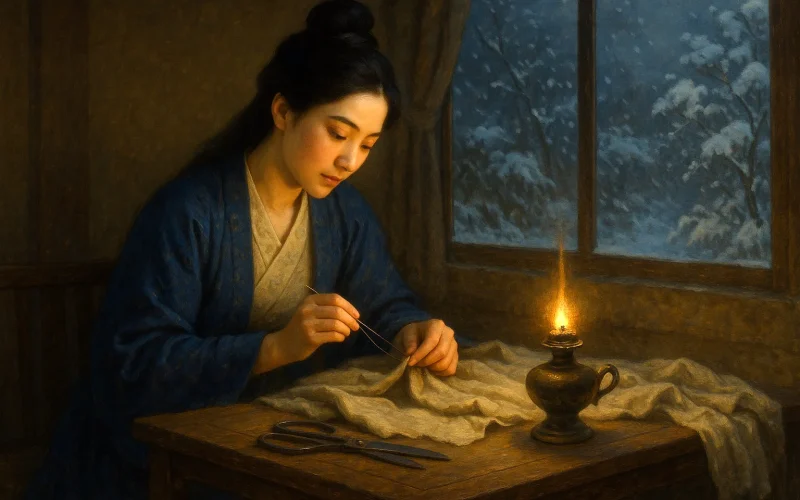Tomorrow morning the messenger will go;
I work all night to make a cotton gown.
My fingers feel so cold to pull the needle;
How can I hold the scissors to cut the cloth out?
I’ve made the gown and sent it to you far away;
How many days will it arrive at the fort?
Original Poem
「子夜吴歌 · 冬歌」
李白
明朝驿使发,一夜絮征袍。
素手抽针冷,那堪把剪刀。
裁缝寄远道,几日到临洮。
Interpretation
This poem is the "Winter Song" from Li Bai's "Song of a Southern Maiden" series, inheriting the tradition of Southern Dynasties folk ballads while infusing deeper national concern and refined poetic artistry. It captures a dramatic life moment—a longing wife rushing to make winter clothes through a cold night—using meticulous details to connect personal affection with the era's wartime backdrop, showcasing Li Bai's exceptional ability to "reveal grandeur through subtlety."
First Couplet: "明朝驿使发,一夜絮征袍。"
Míngzhāo yì shǐ fā, yīyè xù zhēng páo.
The courier departs at dawn; I'll pad the campaign robe all night long.
The opening creates intense urgency through temporal contrast between "dawn" and "all night." The verb "pad" encapsulates a night of labor, establishing the poem's anxious, diligent tone. The impending departure drives the action, compressing time into a single night of devotion.
Second Couplet: "素手抽针冷,那堪把剪刀。"
Sù shǒu chōu zhēn lěng, nà kān bǎ jiǎndāo.
Delicate hands pull cold needles through; How bear the scissors' icy bite too?
This couplet achieves exquisite sensory detail through tactile progression: "pulling needles" feels cold, but "handling scissors" seems unbearable. "Delicate hands" contrast with the "cold" implements, highlighting the woman's fragility against winter's harshness and her task's difficulty, evoking profound sympathy.
Third Couplet: "裁缝寄远道,几日到临洮?"
Cáiféng jì yuǎndào, jǐ rì dào Lintáo?
Sewn and sent along the distant road; How many days to reach Lintáo's post?
Completion brings not relief but intensified emotion. "Sewn and sent" condenses a night's effort; "distant road" stretches worry into uncertainty. The concluding question—"How many days to Lintáo?"—appears simple but forms the emotional climax, blending anxiety, hope, helplessness, and endless concern, revealing the woman's inner turmoil with poignant restraint.
Holistic Appreciation
The poem's artistry lies in extreme condensation and restraint. Thirty characters construct a complete narrative (news → labor → dispatch → question) and multi-layered emotions (urgency → hardship → profound worry). Eschewing scenic description or direct lyricism, the poet uses key actions ("pad," "pull," "handle," "send," "ask") to make a devoted, resilient woman leap from the page. The open-ended question draws readers into shared concern for distant Lintáo, creating powerful artistic resonance across time and space.
Artistic Merits
- Dramatic Moment Capture: The poet seizes the specific moment of "courier's dawn departure" as a pivot, activating character action and emotion with inherent tension and narrative quality.
- Realist Power of Detail: "Pulling cold needles" and "handling scissors" derive from life's finest experiences—their authenticity carries heart-piercing force, exemplifying "revealing spirit through subtlety."
- Action-Based Psychology: Inner world—her love, urgency, worry—flows entirely through external actions, achieving "conveying depth without explicit words."
- Profound Conception in Simple Language: Plain, nearly colloquial diction gains historical depth when "Lintáo" appears, placing personal love within grand national narrative.
Insights
This poem shows how great emotion often resides in ordinary sacrifice. That wife's "padding the campaign robe all night" resonates with countless modern figures preparing luggage for traveling loved ones or waiting silently. It reveals love and responsibility's essence—manifest in tireless labor and heartfelt concern. Simultaneously, the poem serves as a historical mirror, reflecting the specific costs borne by ordinary families beneath grand national stories. It reminds us to cherish peaceful daily life and hold deep empathy for others' separations and waiting, regardless of era.
About the poet

Li Bai (李白), 701 - 762 A.D., whose ancestral home was in Gansu, was preceded by Li Guang, a general of the Han Dynasty. Tang poetry is one of the brightest constellations in the history of Chinese literature, and one of the brightest stars is Li Bai.












